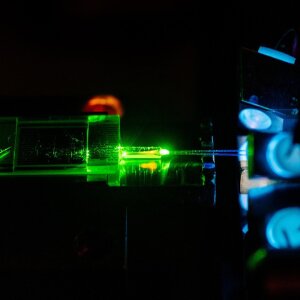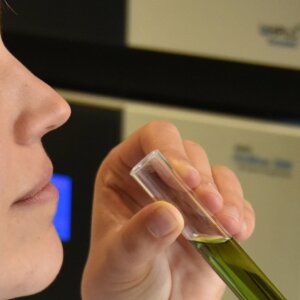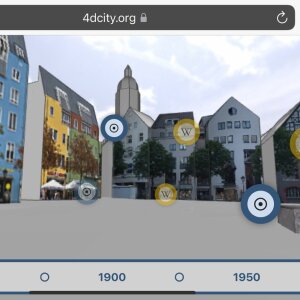New projects
Preserving northern Ethiopia's cultural heritage
Temple complex from the 7th century BC in Yeha in northern Ethiopia.
Image: Klaus Mechelke / DAIResearch team from the University of Jena creates a digital cultural heritage register with partners
Over the next two years, a team of researchers from the University of Jena headed by Prof. Dr Norbert Nebes will be cooperating with the German Archaeological Institute (DAI) to create an »Ethiopian Heritage Digital Atlas« (EHDA). The project, which is being carried out in cooperation with the Ethiopian antiques authority and Addis Ababa University, has received around 215,500 euros in funding from the Gerda Henkel Foundation. The aim of the web-based monument information system is to ensure the preservation of cultural heritage in northern Ethiopia, the region in which the ancient Sabean people left their mark almost 3,000 years ago. The core of the EHDA is a geographic information system that records archaeological sites, monuments and objects and links them to archaeological and geographic information on a map. [US]
Self-presentation practices
Job offers at the Firmentkontaktbörse (company contact fair) on the campus of the University of Jena 2014.
Image: Jan-Peter Kasper (University of Jena)Project examines competences of young people with disadvantages when starting a career
How can young people with disadvantages better manage to get into work after school? This question is being investigated by researchers from the universities of Jena and Paderborn as part of a new research project entitled »Self-presentation practices – approaches to a self-determined, multi-modal skills assessment for young people with disadvantages/disabilities« (»SeiP«). The interdisciplinary project led by business educationist Prof. Dr. Petra Frehe-Halliwell is funded by the Federal Ministry of Education and Research as part of the »Inclusive Education« funding measure with a total of around 700,000 euros over a period of three years. The aim is to develop a further education programme to help young people recognize their own strengths and use them on their career path. [Reckendorf/AB]
Quantum chips
In the »pigtailing« process, fiber-optic cables are fused to an integrated-optical quantum device.
Image: Besim Mazhiqi / Universität PaderbornUniversity of Jena invests in Q.ANT start-up
The Institute of Applied Physics (IAP) at the University of Jena and the Fraunhofer Institute for Applied Optics and Precision Engineering (IOF) are part of the consortium behind Q.ANT, a Stuttgart-based quantum start-up. The Federal Ministry of Education and Research (BMBF) is providing the consortium with 42 million euros in funding, and the consortium partners are contributing a further 8 million euros. The funds will be used to set up a demonstration and testing facility for photonic quantum computer chips. The project members from the University of Jena, led by Prof. Dr Andreas Tünnermann, are taking on development tasks worth 12.6 million euros, including activities related to light sources. In addition, they are contributing their valuable expertise in the field of hybrid assembly and connection technology. The project partners are looking to present their first prototype within the next two and a half years. [Haak]
AI at university
A robot at the Chair of Digital Image Processing at the Faculty of Mathematics and Computer Science holds »The Robbers« by Friedrich Schiller in its artificial hand.
Image: Jan-Peter Kasper (University of Jena)THInKI project strengthens the topic of AI in teaching
As artificial intelligence (AI) continues to permeate all areas of society, AI-related content is being developed for courses offered by the universities of Jena and Ilmenau as part of a new research project entitled the »Thuringian University Initiative for AI in Studies« (»THInKI«). The project is being coordinated by the Thuringian Centre for Learning Systems and Robotics (TZLR) as a joint institution of both universities. In the next four years, the project members will develop course content, teaching materials and qualification opportunities for teaching staff and employees to teach AI skills. Students and lecturers should thus be enabled to gain more knowledge and skills about artificial intelligence. The project will receive around 3.8 million euros in funding from the Federal Ministry of Education and Research (BMBF) over the next four years. [Frezzella/AB]
Digitalizing the sense of smel
A person in the odour laboratory at the University of Jena during the Long Night of the Sciences 2019.
Image: Anne Günther (University of Jena)EU project on the detection of altered body odours
The month of April saw the launch of a project entitled »Smart Electronic Olfaction for Body Odour Diagnostics« (»SMELLODI«). The project members include psychologist Prof. Dr Ilona Croy and Dr Alexander Croy from the Institute of Physical Chemistry. Over the next three years, they will be working with partner institutes in countries such as Israel and Finland to develop intelligent electronic sensors that can detect healthy body odours and those altered by illness and transmit them digitally. This technology is intended to pave the way for the digitalization of our sense of smell. In addition, it can help to make valuable information available and interpretable for medicine as a fast, immediate, and non-invasive diagnostic tool. The project is receiving around three million euros in funding from the European Union. [AB]
Streamlining administration with AI
Cables and connections in a control room of the Division for Facility Management of the University of Jena.
Image: Jens Meyer (University of Jena)Research teams develop AI-based solutions for the digitalization of public administration
The federal, state, and local governments in Germany have committed themselves to digitalizing administrative services as part of the Online Access Act (OZG). Researchers from the University of Jena, in cooperation with the Thuringian Ministry of Finance, Bielefeld University and the Institute of Data Science of the German Aerospace Centre, are now designing AI-based solutions as part of two research projects to prepare public administration for this. The projects are called »Canareno: computer-aided analysis of electronically available legislation« and »SimpLEX: simplifying the creation and processing of electronic documents through the use of machine-readable standards and document modules« and have received around five million euros in funding from the Federal Ministry of the Interior and Community (BMI). [sh]
Jena4D
View of Jena's market square in the year 2000, as depicted in the Jena4D project.
Image: Juniorprofessur Digital Humanities; mit Foto von Sander MünsterVirtual city history book to participate in
Would you like to stroll through Jena’s city centre and see on your smartphone what it used to look like? Jena4D will soon make this journey back in time possible. The aim of the new project led by Dr Andreas Christoph and Junior Prof. Dr Sander Münster is to invite citizens to remember times of old and share historical photographs. Jena4D will expand an existing browser application to display the entire city centre in 4D. The historical photographs will be supplemented with stories and anecdotes. In addition, participants will be able to create and design digital city tours to piece together a digital 4D history book for tourists, older residents, and future generations. The one-year project will receive around 200,000 euros in funding from the German Federal Cultural Foundation as part of the »dive in« programme. [Barbutev]
How do I want to be?
Work in the intensive care unit of the University Hospital Jena
Image: UKJTeaching project supports personal development in medicine
Medical studies convey specialist knowledge and practical skills – and patients, colleagues and society also high expectations of doctors' sense of responsibility and integrity. Jena University Hospital (JUH) wants to foster a scientific and professional ethos in prospective physicians by offering a new range of long-term courses aimed at developing a sense of medical professionalism. The »Longitudinal Curriculum for the Development of Medical Professionalism« (»LongProf«) is currently in the pilot phase and is scheduled to last two years. The range of courses will be aimed at students from the fifth semester onwards. The project is headed by Dr Sven Schulz, whose Institute of General Practice and Family Medicine at the hospital is responsible for the overall coordination. [vdG]







